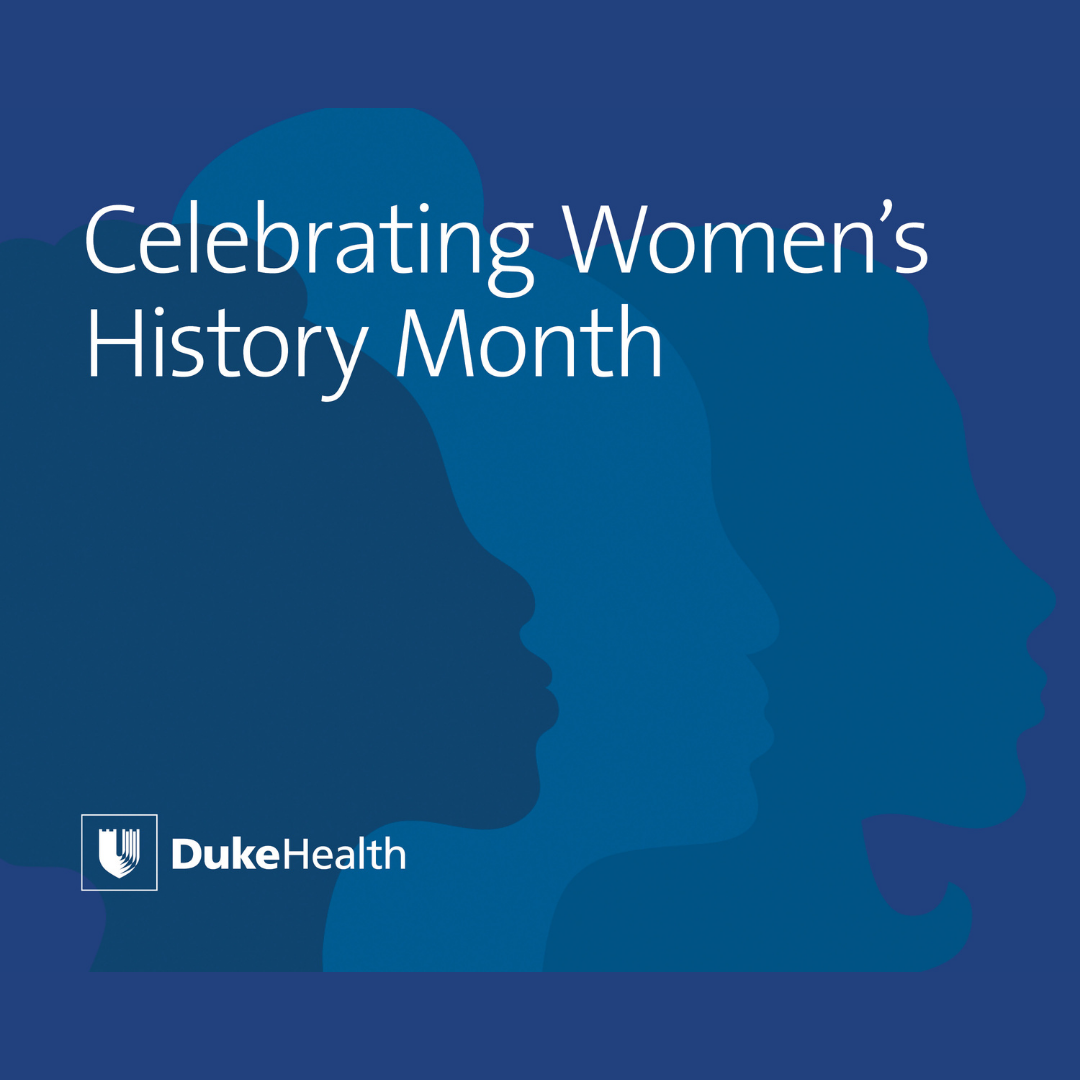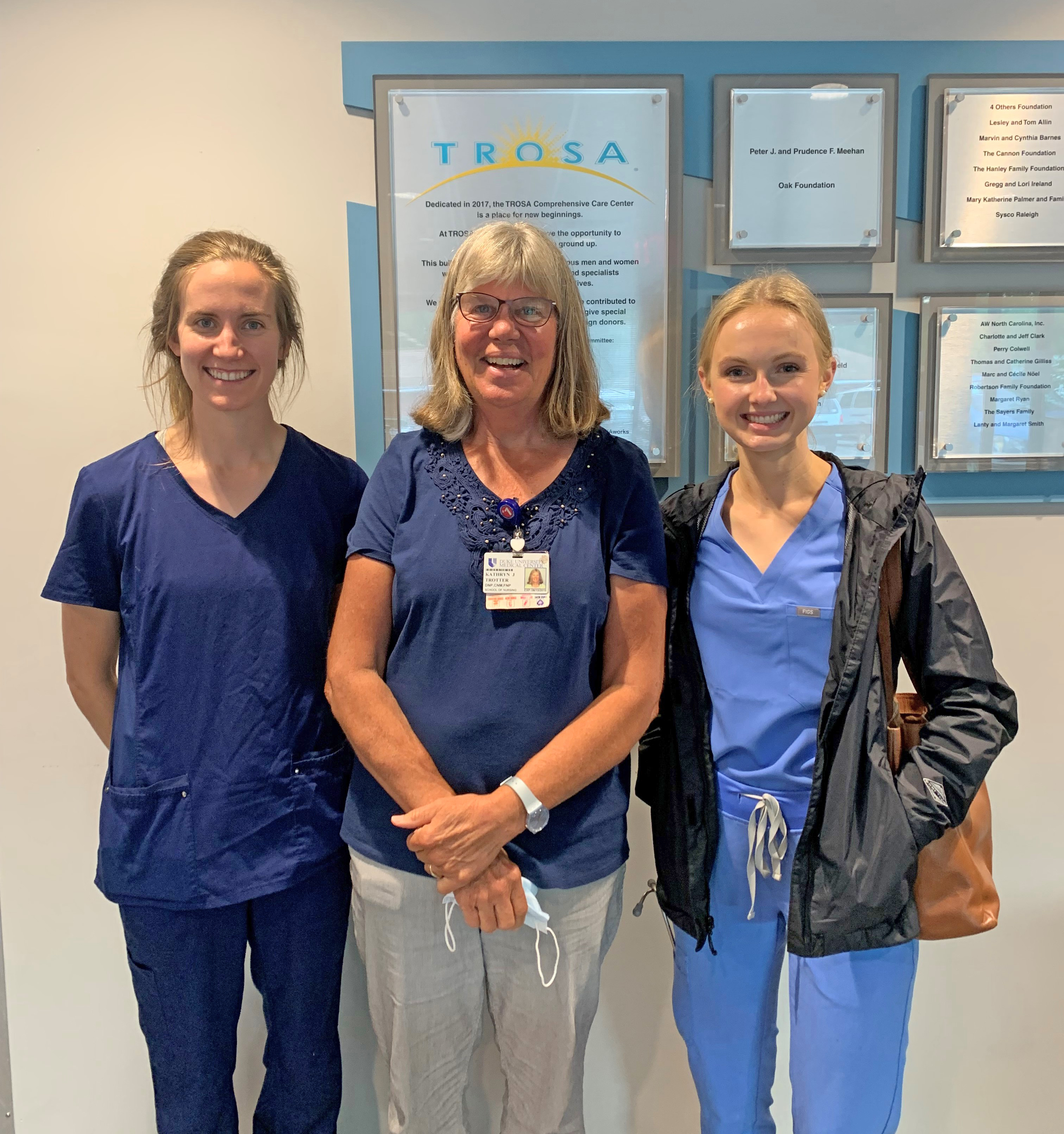Duke School of Nursing Celebrates, Cares for Women Through Health Care Practices, Nursing Education
Since 1987, Women’s History Month has served as an annual opportunity to celebrate and reflect upon the accomplishments and roles of American women. This month, we take time to acknowledge and uplift the past, present and future women of the Duke University School of Nursing community.

Since 1987, Women’s History Month has served as an annual opportunity to celebrate and reflect upon the accomplishments and roles of American women. This month, we take time to acknowledge and uplift the past, present, and future women of the Duke University School of Nursing community.
With women holding 76-percent of all full-time jobs in health care particularly in nursing, women nurses inside and outside of Duke have great potential to carry on the work of the women nurses before them while being poised to enact real change for the future of health care and nursing.
Women nurses’ historical contributions have been great and varied, from breaking gender and cultural barriers to developing innovative nurse-led models of care. Nurses like:
- Mary Mahoney, RN, the first Black American to earn a nursing degree in 1879 and the nation’s first Black professional nurse;
- Beverly Malone, PhD, RN, FAAN, National League for Nursing’s current president/CEO who, in 2000, was appointed to the highest federal government position ever by a nurse at the time: deputy assistant secretary for health at the United States Department of Health and Human Services;
- Sharon Schindler Rising, MSN, CNM, FACNM, Center Healthcare Institute founder who developed the Centering model of group health care, a system meant to help provide more effective prenatal care to her patients and that has earned the Civic Ventures Purpose Prize, the American Academy of Nursing’s Edge Runner Award, and the American College of Nurse-Midwives' the Hattie Hemschemeyer Award, the group’s highest honor.
Since 1931, the Duke University School of Nursing has been preparing the next generation of nurses primarily under the leadership of female deans. Today, women continue to serve in leadership roles at the school as well as hold various faculty and staff positions.
One such woman is Kathryn J. Trotter, DNP, CNM, FNP-C, CHSE, FAANP, FAAN, associate professor and lead faculty for the Women’s Health Nurse Practitioner (WHNP) Program — one of only two such programs in the Southeast. In addition to her faculty role, Trotter continues to practice as a certified nurse-midwife and family nurse practitioner (NP) with Duke University Medical Center and as senior NP for the breast surgery clinic as well as the high-risk breast cancer clinic at the Duke Comprehensive Cancer Center.
The need for women’s health specialists is great, and the WHNP MSN/DNP Program works to bridge that workforce gap and address the existing disparities in women’s health care, including the major health disparities in research, prevention, and treatment of diseases that mainly affect women, such as breast and cervical cancer, as well as other health issues that are leading, yet often overlooked, causes of death for women, such as heart disease and stroke.
Identifying current measures empowers Trotter and the WHNP Program faculty to guide their students in the right direction. Last year, the White House released its National Strategy on Gender Equity & Equality — the first-ever United States government strategy on gender equity and equality. This comprehensive agenda addresses how gender impacts health care.
“We need to (invest) in research that explores the specific needs of women of color and the social determinants of health that often contribute to racial, ethnic and other disparities,” the report said.
The maternal mortality rate for 2020 was 23.8 deaths per 100,000 live births, an increase from 2019. The rate among non-Hispanic Black women was 2.9 times the rate for non-Hispanic White women.
“We will take a whole-of-government approach to cutting the maternal mortality and morbidity rates, closing racial disparities, and addressing the systemic racism that has allowed these inequities to exist in maternal care and outcomes,” the report said. “Our maternal health strategy will advance the expansion of Medicaid post-partum coverage to a full year, invest in rural maternal health efforts, and tackle health disparities head on, including through better data collection and reporting, improved training for providers (including implicit bias training), and diversifying the perinatal workforce.”
Since its founding in 2016, 99 students have graduated from the WHNP Program at Duke. The distance-based major combines broad foundational knowledge with specialty knowledge essential for the unique health needs of women; students also meet on campus each semester to get hands-on training with instructors and to work with standardized patients, manikins, and other resources in the school’s accredited simulation lab.
Throughout their second year, WHNP students focus on women’s and gender primary and specialty care topics and processes, including OB/GYN general practice, maternal and fetal medicine, GYN and breast oncology, fertility, and teen sexual health. They volunteer to staff the local TROSA gynecological clinic and help teach women’s health skills to the first-year Duke NP students. Students learn facilitation skills for group medical visits and may also take specialty certifications concurrently in HIV care, endocrinology, orthopedic, oncology, or cardiology.
“Our graduates train and practice throughout the U.S.,” Trotter said. “We take advantage of that reach to improve the health of women in our communities not only locally here in Durham but in cities and towns around the nation. They are prepared to be an integral part of the perinatal workforce and are focused on addressing gender health care every day.”
